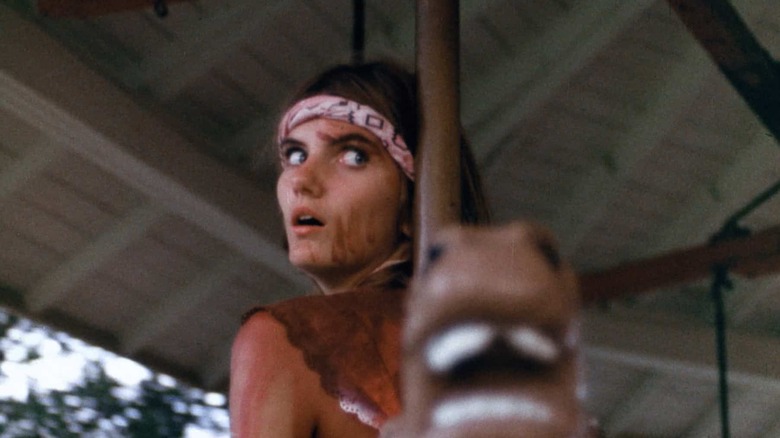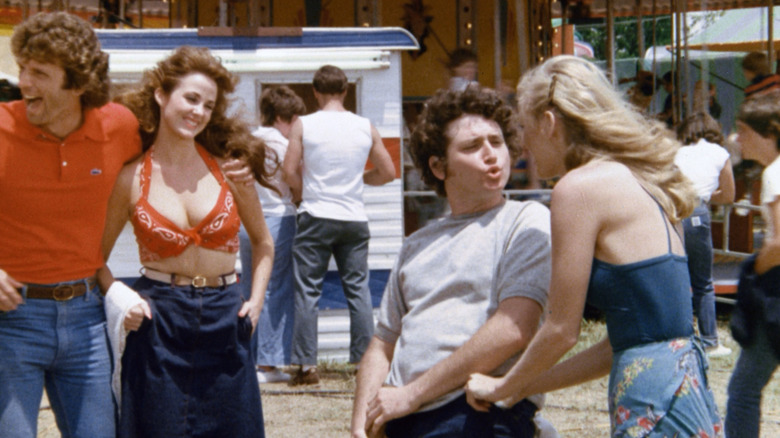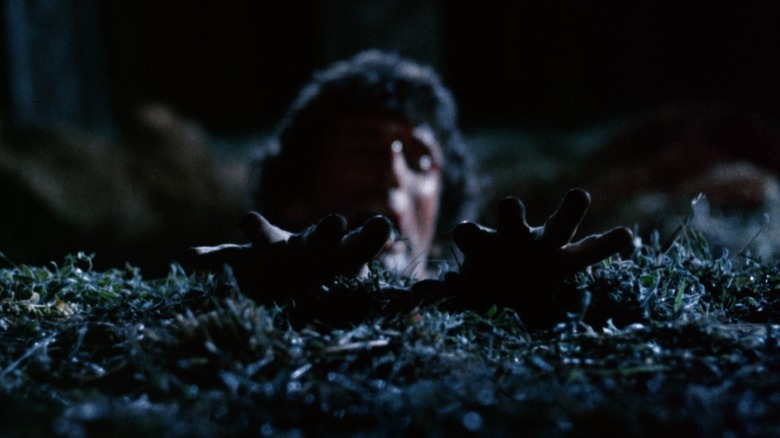The Forgotten '80s Slasher That Brought Us A Carnival From Hell
David Nelson's "Death Screams" is an obscurity even amongst fans of obscure 1980s horror movies. It's a peculiar piece of regional filmmaking that boasts a legitimately creepy atmosphere, engagingly quirky characterization and, most importantly for a film chasing that post-"Halloween" slasher dollar, a heapin' helpin' of wretch-inducing gore.
But unlike regional '80s bloodbaths like Edwin Brown's "The Prey" or Buddy Cooper's "The Mutilator," "Death Screams" didn't have a major home video distributor like New World or Vestron behind it. In my adolescence, I was fortunate enough to have access to a number of well-stocked video stores, and, trust me, I scoured their horror shelves for slasher gems like Fred C. Dobbs questing gold in the Sierra Madre. "Death Screams" — or, as it was sometimes titled, "House of Death" — was MIA. I wasn't aware of the movie until the advent of the Usenet era when it would occasionally pop up on message board lists of underrated slasher flicks — at which I was faced with the challenge of tracking down an exceedingly rare physical copy.
This proved nearly impossible for a time because, once the pre-postmodern (i.e. "Scream") slasher era ended in the early 1990s, there was little demand for the ugly, unironic brutality of the old stuff. It wasn't until people could digitize VHS tapes and torrent their contents online that the deep cuts of 1980s horror started making the rounds. Even then, the rediscovery of "Death Screams" was a slow burn. And this is probably because Nelson and screenwriter Paul C. Elliott turn the second act into an ambling, Robert Altman-esque slasher (should've called it "Slashville").
A surprisingly ingratiating hang-out slasher
Like most effective films of this largely disreputable subgenre, "Death Screams" starts off with a kill. In this case, it's a couple of young lovers who get impaled in some indistinguishable fashion (the lighting ain't so hot at times in this movie) and dumped in a river adjacent. It's a ho-hum opening until the credits kick in. Dee Barton, who wrote music for several Clint Eastwood productions in the 1970s ("Play Misty for Me," "High Plains Drifter" and "Thunderbolt and Lightfoot"), unleashes an symphonic theme that's standard thriller fare until it abruptly crescendos into what it might've sounded like had Bill Conti's orchestra been asked to play the Zodiac Killer onto an Oscars broadcast.
Nelson's film threatens to lapse into conventionality in the early going as the premise becomes clear: a traveling carnival has arrived in a small village, and the townspeople are too caught up in the summertime festivities to realize there's a killer on the loose. Nelson swiftly introduces the major players — e.g. the sheriff, two kind-hearted sweethearts making the most of their time before they head back to college, the studly local baseball coach, a mousy young woman forced to care for her decrepit grandmother (who raised her under suspicious circumstances) and a squirrely, mentally disabled adult who might as well be named Cropsey — and gets right down to business with the jump scares.
The quaint trappings of Shelby, North Carolina lend the film an anti-Hollywood authenticity. The same goes for the mostly non-professional cast. Even the lead, former Playboy Playmate Susan Kiger, exudes an unpolished, happy-to-be-here innocence. It's a total community theater aesthetic, which gets you rooting for everyone to make a film of merit on its own exploitative terms.
And then there was no fun
The middle section of the movie should be interminable. Nelson lets his narrative engine idle and asks us to invest in the hopes and dreams and dead-end bitterness of a surprisingly varied ensemble cast as they flit about the carnival. You've got your standard machete fodder in six fun-loving townies (who get stoned and goof around on the various attractions), and the adults who frown at their antics. But there are also peripheral characters like the coach's ex-girlfriend, who, upon being rebuffed anew, trashes his convertible with whipped cream. Elliott's dialogue is witless at every turn (save for Grannie's trenchant "If his brains were TNT, he couldn't muster a good fart"), but, again, the actors are fully committed to the production. They're having a blast. And Nelson, who grew up as a performer and, eventually, director on the public stage as the elder son of TV's Ozzie and Harriet Nelson, gives every member of the cast their moment to shine. They're not virtuoso actors, but they are believable in their roles.
It's almost a shame when Nelson has to start knocking these folks off, but he does so with all the technical elan his low budget will allow. This means knowing how to light a fogged-up forest and resorting to tried-and-true special effect trickery. The kills are above average for a cheapie '80s slasher. The severed hands clenching at the edge of a freshly dug grave, and the poor young woman who gets torn in half after plunging through a rotting staircase are gruesome highlights. Nelson badly telegraphs what could've been a satisfying killer reveal, but at least we get to see the monster die a definitive, no-sequel-for-you death.
Best of all, the carnival setting is a total misdirect. You go in expecting a retread of Tobe Hooper's "The Funhouse," but, in the end, the carnival is just a slightly sinister backdrop. There are no scuzzy barkers, no weirdo ride operators, and absolutely no geeks. For once, it's the folks of a cozy little town who bring evil to the merry-go-round.
"Death Screams" is primo trash for those that know from dumpster diving.


